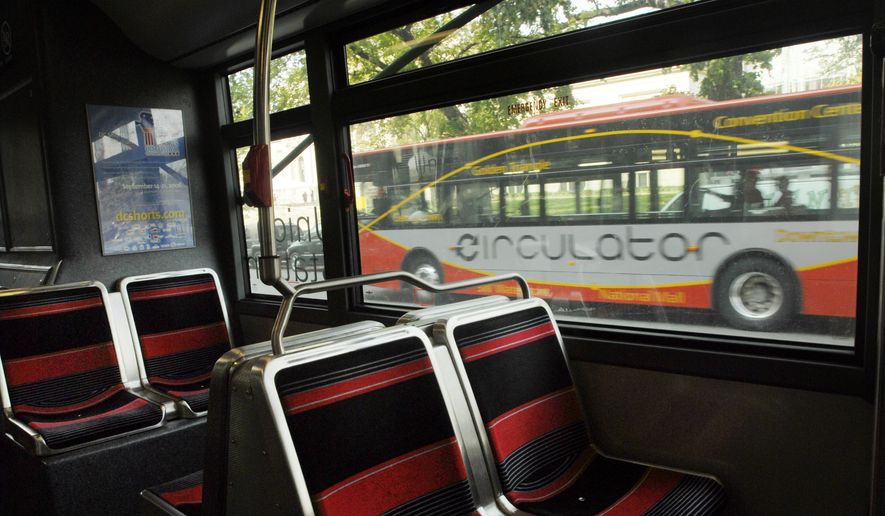Starting Tuesday, it will cost a dollar again to ride the DC Circulator, but some city officials are looking at ways to reinstate the free ride.
“We have seen tremendous benefits from the free circulator I am hopeful that the [D.C.] Council will act to keep it free,” said Jeff Marootian, director of the District Department of Transportation (DDOT).
Mr. Marootian said the free downtown bus service made transit more affordable and reduced single-occupancy car trips, adding that he has seen an increase in circulator ridership.
But council member Mary Cheh, chair of the Transportation Committee, questioned Mayor Muriel Bowser’s decision in February to make the DC Circulator free without a thorough consideration of how it would affect businesses, Metro and bikeshare, or whether it was an equitable way to spend city funds since the bus’ routes mostly lie downtown and serve tourists.
“And there was no evidence that a free circulator would lead to decreasing cars on the road, it is illogical to think that would happen,” Mrs. Cheh said, adding that a dollar fare wasn’t deterring people from driving in the first place.
“We don’t have an endless supply of money,” the Ward 3 Democrat said. “If we are going to spend money on something, it has to be dedicated to the best use of that money.”
Cheryl Cort, policy director for the Coalition for Smarter Growth, said that bus services are “critical to extremely low-income residents in our region,” noting that almost half of bus riders have a yearly income of about $30,000.
The DC Circulator serves about 16,000 people daily, while Metrobus transports about 400,000 a day, according to a study by the Bus Transformation Project, an ongoing regional effort to improve bus service.
“Increasing the price differential between Circulator and Metrobus, rather than lowering fares across the board, distorts how riders use the system, and can create a sense of inequity,” the Coalition for Smarter Growth’s report card on the D.C. bus system.
Ms. Court said free rides for all public transit is ideal, but she encourages lawmakers to consider at least offsetting the cost for low-income riders.
Miss Bowser announced in February that the DC Circulator would be free for that month, and she then made it a permanent change in her budget proposal. The circulator, along with the DC Streetcar and Capital Bike Share, are the only transit options over which the District has sole control.
However, the D.C. Council rejected her proposal to allocate $1.3 million for the free ride citing a lack of analysis for the decision, which Mrs. Cheh called a “thoughtless giveaway.”
In June, council member Brandon Todd, Ward 4 Democrat, introduced the DC Circulator Equity Act of 2019 to make the circulator free again and expand service to all eight wards, as opposed to the five wards it serves now.
Ms. Cheh said she isn’t sure when she would hold a hearing on the legislation because her committee is backed up right now.
She said it is always a consideration for her committee about equity. And when she hosts a hearing about the electric scooters in early November, she wants to make sure they are placed in all eight wards, not just downtown.
Meanwhile, DDOT is planning a circulator route that would go through Ward 7, Mr. Marootian said.
“At this point we are in the early stages of both procuring the buses and the facility,” the director said.
Despite the change in fare for the DC Circulator, Mr. Marootian said the DC Streetcar will remain free.
• Sophie Kaplan can be reached at skaplan@washingtontimes.com.




Please read our comment policy before commenting.